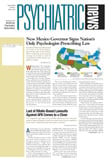Health care professionals, including physicians, nurses, psychologists, and therapists, are not training enough of their members to treat the elderly, who are rapidly increasing in numbers, warned members of the Senate Special Committee on Aging in February.
One of the professions where there is already a shortage is geriatric psychiatry. APA and the American Association for Geriatric Psychiatry (AAGP) pointed out in written statements to the committee that since 1991, 2,508 psychiatrists have been certified in geriatric psychiatry by the American Board of Psychiatry and Neurology. AAGP predicted that twice as many geriatric psychiatrists will be needed by 2010 to meet the projected demand for service. An additional 1,221 academic geriatric psychiatrists will be needed by 2010 to train future residents in that specialty, added AAGP.
These projections are based on the expected rapid growth of the elderly population due to the 76 million “baby boomers” who will reach age 65 between 2010 and 2030, according to AAGP. By 2030 older adults will account for 20 percent of the total U.S. population, up from 13 percent in 2000, said AAGP.
As the population ages, the number of older Americans experiencing mental health problems is expected to increase. Nearly 20 percent of those who are 55 or older experience mental disorders, said AAGP. The most common conditions are anxiety, severe cognitive impairment, and mood disorders.
Sen. John Breaux (D-La.) also complained that only three of the 125 medical schools in the nation have a geriatric department, and only 14 require medical students to take a course in geriatric medicine.
APA stated that there are 56 accredited postgraduate programs in geriatric psychiatry nationwide. This additional geriatric training gives general psychiatrists “the in-depth experience in the diagnosis and treatment of mental health disorders in older adults,” according to AAGP.
APA and AAGP urged the committee to support the Advancement of Geriatric Education Act (S 1362), which would increase the number of trainees in and funding for geriatric residency and fellowship programs. The bill, introduced by Sens. Tim Hutchinson (R-Ark.) and Larry Craig (R-Idaho) last year, would allow teaching hospitals to add a limited number of training positions in geriatric medicine and geriatric psychiatry without reducing the number of training slots in other fields. The number of training positions funded primarily through Medicare was capped by the 1997 Balanced Budget Act at 1996 levels, according to AAGP testimony.
APA President Richard Harding, M.D., told Psychiatric News, however, that “education and training are only a partial solution to a much larger problem, namely, the barriers to delivering medically necessary psychiatric services to older Americans.”
Harding complained that Medicare policies continue to pose significant barriers to treating the elderly with mental illnesses. Two longstanding discriminatory policies are the 50 percent copayment required for outpatient mental health services and the 190-day lifetime limit on inpatient treatment in psychiatric hospitals, said Harding.
In addition, state Medicaid plans are required to pay Medicare premiums, deductibles, and copayments for low-income patients. However, the Health Care Financing Administration notified state Medicaid directors in 1992 that payment of the Medicare copayment for outpatient psychiatric services was optional, so many stopped paying it, according to APA’s statement to the Senate committee.
“This is double discriminatory treatment of low-income patients who qualify for both Medicare and Medicaid,” said Harding.
Psychiatrists who are reimbursed by Medicare continue to experience paperwork hassles due to too many regulations and widespread variations in the way Medicare carriers interpret federal Medicare rules, complained APA. A more recent Medicare problem is the 5.4 reduction in Medicare reimbursement rates for 2001.
APA urged the Senate committee to support several bills designed to fix these and other problems with Medicare:
• The Mental Illness Non-Discrimination Act (HR 599/S 841) would repeal Medicare’s discriminatory 50 percent copayment for outpatient psychiatric services. Medicare patients would be charged a 20 percent copayment for all medical services, including psychiatric care.
• The Medicare Regulatory and Contracting Reform Act (HR 3391) would give physicians flexibility in setting up Medicare overpayments, limit the use of repayment extrapolation formulas and prepayment reviews, and require carriers to provide clear and timely responses to physicians’ questions. The bill passed the House unanimously last year but has yet to be taken up by the Senate.
• The Medicare Mental Health Modernization Act (HR 1522/S 690) would repeal the 190-day lifetime limit on inpatient treatment in psychiatric hospitals and establish intermediate-level services not currently covered by Medicare.
• The Medicare Physician Payment Fairness Act (HR 3351/S 1707) would address the negative payment update in the 2002 fee schedule and direct the Medicare Payment Advisory Commission to conduct a study on replacing the sustainable growth rate as a factor in determining future payment updates.
APA urged the Senate committee to “take a holistic approach to the problem, addressing the supply of physicians who are trained in geriatric medicine while simultaneously acting to end the tremendous disincentives to patients seeking care for mental illnesses.”
